| Listing 1 - 10 of 17 | << page >> |
Sort by
|
Book
Year: 1991 Publisher: Santa Monica, CA : RAND Corporation,
Abstract | Keywords | Export | Availability | Bookmark
 Loading...
Loading...Choose an application
- Reference Manager
- EndNote
- RefWorks (Direct export to RefWorks)
This report explores retirement as a social-psychological process, particularly from the perspectives of role incumbents on either side of the transition. It also considers whether and how networked information and communication technology helps to create or maintain task processes and social ties for spatially distributed groups, and attempts to determine what part such technology might play in supporting interactions among retired individuals and between them and their still-employed peers. It extends earlier studies of technology transfer and utilization, of social behavior in relatively healthy community-resident older adults, and of the effects of computer support in varied kinds of task groups by using a more powerful research design--a field experiment--that permits an evaluation of the comparative capability of new electronic media to provide intellectual and affective links between people who have no prior experience in using networked interactive systems. The experiment demonstrates that computers can serve as an effective infrastructure for social interchange; they are superior to traditional media for overcoming spatial and temporal barriers to interaction.
Older people --- Retirement --- Communication --- Psychological aspects. --- Social networks --- Technological innovations. --- Attitudes.
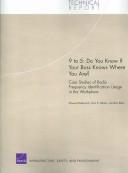
ISBN: 0833037196 9786612283048 0833041126 1282283049 1598752995 9780833041128 9780833041050 9780833037190 9780833037190 9781598752991 9781282283046 0833041053 6612283041 Year: 2005 Publisher: Santa Monica, CA : Rand Corp.,
Abstract | Keywords | Export | Availability | Bookmark
 Loading...
Loading...Choose an application
- Reference Manager
- EndNote
- RefWorks (Direct export to RefWorks)
Describes a case study of six enterprises that use Radio Frequency Identification (RFID) tags to control access in the workplace to understand their policies about personally identifiable records obtained by sensing RFID-based access cards. These policies have a number of common features, but the policies are neither documented nor shared with employees.
Electronic monitoring in the workplace - United States. --- Electronic monitoring in the workplace --- Electronic monitoring of employees --- Electronic monitoring of --- Radio frequency --- Radio frequency identification systems --- Employee rights --- Privacy, Right of --- Identification systems, Radio frequency --- RF/ID systems --- RFID systems --- Identification --- Radio telemetry --- Near-field communication --- Radiofrequency --- Frequencies of oscillating systems --- Radio measurements --- Radio waves --- Employees --- Electronic surveillance --- Equipment and supplies
Book
Year: 2000 Publisher: S.l. Rand Europe
Abstract | Keywords | Export | Availability | Bookmark
 Loading...
Loading...Choose an application
- Reference Manager
- EndNote
- RefWorks (Direct export to RefWorks)
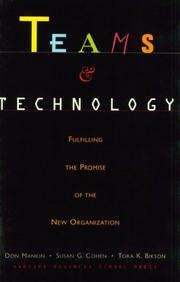
ISBN: 0875843999 Year: 1996 Publisher: Boston, Mass. : Harvard Business School Press,
Abstract | Keywords | Export | Availability | Bookmark
 Loading...
Loading...Choose an application
- Reference Manager
- EndNote
- RefWorks (Direct export to RefWorks)
Information technology --- Organizational change --- Teams in the workplace --- Technologie de l'information --- Changement organisationnel --- Equipes de travail --- Data processing --- Informatique --- Information technology. --- Organizational change. --- Data processing.
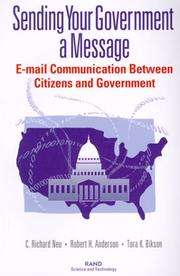
ISBN: 0833043463 0585360642 9780585360645 9780833043467 9780833027542 0833027549 Year: 1999 Publisher: Santa Monica, CA RAND
Abstract | Keywords | Export | Availability | Bookmark
 Loading...
Loading...Choose an application
- Reference Manager
- EndNote
- RefWorks (Direct export to RefWorks)
Administrative agencies --- Executive departments --- Electronic mail systems --- E-mail systems --- Electronic message systems --- Email systems --- Data transmission systems --- Telematics --- Voice mail systems --- Departments, Executive --- Government ministries --- Ministries, Government --- Ministries, State --- State ministries --- Agencies, Administrative --- Executive agencies --- Government agencies --- Regulatory agencies --- Administrative law --- Public administration --- Communication systems. --- Law and legislation --- Administration publique --- Ministères --- Courrier électronique --- Communication systems --- Communication, Systèmes de
Book
ISBN: 0833006851 Year: 1985 Publisher: Santa Monica, CA : Rand,
Abstract | Keywords | Export | Availability | Bookmark
 Loading...
Loading...Choose an application
- Reference Manager
- EndNote
- RefWorks (Direct export to RefWorks)
Office practice --- Business --- Information storage and retrieval systems --- Bureautique --- Gestion --- Systèmes d'information --- Automation --- Data processing --- Informatique --- Affaires
Book
ISBN: 1598751883 Year: 2003 Publisher: Santa Monica : RAND Corporation,
Abstract | Keywords | Export | Availability | Bookmark
 Loading...
Loading...Choose an application
- Reference Manager
- EndNote
- RefWorks (Direct export to RefWorks)
Is the USA producing the leaders it will need in the 21st century? The authors of this study interviewed representatives of internationally oriented organizations, queried experts who could provide insights on this topic and reviewed literature on US leadership in international affairs.
Book
Year: 2002 Publisher: Santa Monica, CA : RAND Corporation,
Abstract | Keywords | Export | Availability | Bookmark
 Loading...
Loading...Choose an application
- Reference Manager
- EndNote
- RefWorks (Direct export to RefWorks)
At the request of Romania's Ministry of Foreign Affairs (MFA), the authors conducted a preliminary needs assessment and feasibility study of information and communication technology (ICT) in the Ministry to lay the foundation for future modernization stages, including the development of a detailed system design and subsequent system implementation. The researchers see future ICT implementation as having two main components: (1) providing a basic infrastructure for digital work practices and (2) completing projects to improve specific critical business processes. The MFA has made a go-ahead decision for ICT modernization, and the initial pieces of an implementation strategy are in place. The study suggests that the Ministry immediately acquire the needed human and financial resources to take the next implementation steps. Current positive developments in the Romanian government indicate that now is the right time for the MFA to move forward aggressively on its modernization agenda.
International relations --- Administration. --- Romania. --- Management. --- Romania --- Foreign relations administration.
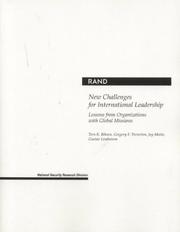
ISBN: 083303345X Year: 2003 Publisher: Santa Monica Rand
Abstract | Keywords | Export | Availability | Bookmark
 Loading...
Loading...Choose an application
- Reference Manager
- EndNote
- RefWorks (Direct export to RefWorks)
International business enterprises --- Leadership --- Organizational effectiveness --- Management
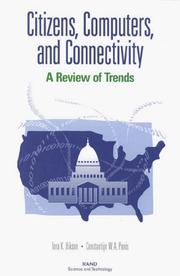
ISBN: 0585237557 9780585237558 9780833027788 0833027786 Year: 1999 Publisher: Santa Monica, Calif. RAND
Abstract | Keywords | Export | Availability | Bookmark
 Loading...
Loading...Choose an application
- Reference Manager
- EndNote
- RefWorks (Direct export to RefWorks)
| Listing 1 - 10 of 17 | << page >> |
Sort by
|

 Search
Search Feedback
Feedback About UniCat
About UniCat  Help
Help News
News